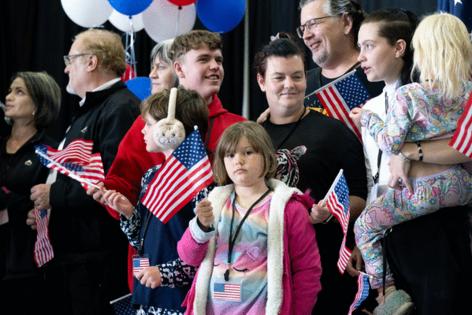White South African refugee family now calls Minnesota home. More are expected
Published in News & Features
MINNESOTA -- A family of Afrikaners, white South Africans granted refugee status earlier this year by President Donald Trump, is now living in northwest Minnesota, and more are expected to arrive here this year.
A family of fewer than 10 was reunited in May with an immediate family member already living here, according to Minnesota’s Refugee Resettlement Office. State officials said they learned in May that the family would be coming, but for privacy reasons did not provide details about when they arrived or where they are living.
The Afrikaners are some of the few refugees to trickle into the U.S. since Trump took office and upended the resettlement program. Minnesota has a long history of welcoming people fleeing persecution, including Hmong, Somalis, and Karen from Myanmar.
But those arrivals essentially stopped when Trump froze the resettlement program in January. Refugees who spent years going through the vetting process had their travel plans abruptly cancelled, while the Afrikaners’ cases were fast-tracked.
The decision frustrated many refugee advocates.
“It’s tragic because there are so many people sitting in refugee camps,” said Jane Graupman, executive director of the International Institute of Minnesota. “I don’t have anything against South Africans. I just think when it comes to priority of need, the camps are a pretty compelling case. People have been waiting decades to be resettled to another country.”
Local news reports from around the country say Afrikaners have also been resettled in New York, Nevada, Idaho, Iowa, North Carolina and Texas. More are arriving in Minnesota, but it is unclear when or where they will be resettled.
“Minnesota remains prepared and willing to help refugees reunite with loved ones, establish well-being and contribute to Minnesota communities,” Rachele King, state refugee coordinator, said in a statement.
The president has broad control over federal refugee resettlement programs, which are part of the State Department in the executive branch. Each fall, after consulting with Congress, a presidential determination dictates how many refugees will be admitted and the region in which they will be resettled.
During his term, President Joe Biden set the ceiling at 125,000 refugees a year that could come to the U.S., although the actual annual number was lower. Trump is expected to set the 2025 maximum at less than one-third of that, and the majority are expected to be Afrikaners, Reuters has reported.
The administration is also expected to limit special immigrant visas for people from Afghanistan and Iraq who aided U.S. military forces during conflicts.
Why Trump considers Afrikaners refugees
Trump halted the U.S. refugee resettlement program the day he took office in January. Weeks later, he announced that 59 Afrikaners, descendants of the Dutch settlers who colonized South Africa, were being given refugee status.
Trump claimed the group faces “government-sponsored race-based discrimination,” including property confiscation, and falsely said they were the subject of “a genocide.” Billionaire Elon Musk, who grew up in South Africa, has been an outspoken advocate of the Afrikaners.
Trump is also unhappy with South Africa’s diversity policies and its allegation to the International Court that Israel is committing genocide in Gaza.
In January, South African President Cyril Ramaphosa signed a law allowing state seizures of land without compensation in an effort to address an imbalance in land ownership in place since the apartheid era. Black South Africans make up more than 80% of the country’s population, but most of the farmland is still owned by the white minority.
The law doesn’t explicitly allow the government to take land from Afrikaners. It lays out specific circumstances in which land not being used can be taken, if it is in the public interest.
Between 2012 and 2024, five people from South Africa came to the United States as refugees, according to federal data.
Other refugee resettlements in limbo
Minnesota has three organizations — Arrive Ministries, Lutheran Social Service of Minnesota and the International Institute of Minnesota — with government contracts to resettle refugees. They help them find work, learn the language and acclimate to life in their new home.
Leaders of all three said their work with new arrivals ground to a halt when Trump froze the resettlement program. Nearly 3,000 refugees were resettled in Minnesota in 2024 and about 1,000 came here in the first quarter of the 2025 fiscal year before Trump took office, according to state and federal records.
Refugees who were approved to come to the U.S. and had their plans cancelled at the last minute are suing the Trump administration and the case is working its way through the courts. Some of them have been able to come to the U.S.
Once refugees arrive in Minnesota, they are typically assigned to a resettlement contractor. The first group of Afrikaners who came to the state worked with a national organization.
In an email, a Lutheran Social Service spokeswoman said the organization was recently notified of a new, small group of refugees coming to Minnesota. The group includes some refugees who were approved to come to the U.S. before Trump took office, as well as some Afrikaners.
“While we are not involved in decisions about refugees who are selected to come to the U.S., we are here to serve any refugee who has received approval to come to the U.S. and needs our assistance to become self-sufficient as quickly as possible,” the email said.
©2025 The Minnesota Star Tribune. Visit at startribune.com. Distributed by Tribune Content Agency, LLC.







Comments